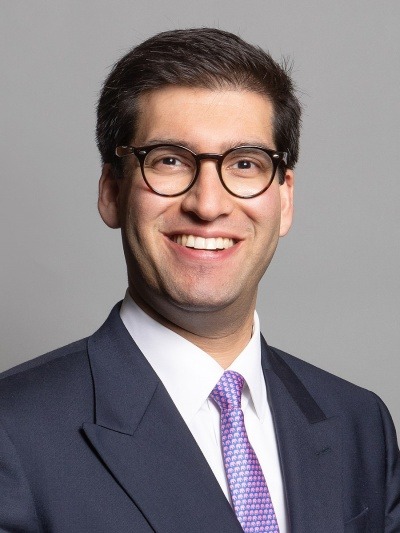Ranil Jayawardena appointed Environment Secretary in Truss’ first cabinet
As new PM Liz Truss announces her cabinet, Ranil Jayawardena, Conservative MP for North East Hampshire, has been named as the new Environment Secretary.

Leaving his post as Under-Secretary for International Trade, Jayawardena will take over from George Eustice MP, who held the post for over two years following Boris Johnson’s cabinet reshuffle in February 2020.
In a statement on Twitter, Jayawardena shared: “It is a privilege to be appointed the Secretary of State for the Department for Environment, Food, and Rural Affairs (Defra). From food security and backing British farmers, to water security and growing our rural economy, I know that there is much to do. It is so important to recognise where our food comes from.”
Kemi Badenoch, who went up against Truss in the Conservative leadership race, will take over from Jayawardena at the Department for International Trade.
His appointment is accompanied by those of Alok Sharma, as new president of COP26, and Graham Stuart, as Minister for Climate in the Department for Business, Energy, and Industrial Strategy.
First elected in May 2015, Jayawardena is not shy of high-profile cabinet positions, having been named as Deputy Chairman of the Conservative Party by Boris Johnson in February 2020. He was also a member of the International Trade, Home Affairs, Procedure, and Arms Export Controls Committees.
It was just three months later that he was moved to the Department of International Trade, following the resignation of Conor Burns.
Prior to his career in Westminster, Jayawardena worked for Lloyds Banking Group while working his way up in Local Government. In 2008, he was appointed Deputy Leader of the Borough of Basingstoke and Dean, an area in his current constituency, before running for Parliament in 2015.
Voting history
Alongside a continued interest in policing, crime, and railway networks, Jayawardena has often voted on environmental legislation. He has voted against a number of clauses in the Environment Bill, including one permitting landowners to install CCTV cameras where fly-tipping has occurred in the past, and one prohibiting the burning of peat in upland areas.
The MP expressed a deeper interest in the importance of land sustainability and its connections to farming, with the formation of the Agriculture Bill 2020.
In a 2018 debate with then-Environment Secretary Michael Gove, Jayawardena asked: “Is it not true that the high standards we have in this country and some of the niche products we produce are what make our exports so attractive, so the Bill, by creating a greener agricultural system and rewarding farmers for doing the right thing in managing our environment for the long run, is good not only for our economy, our environment and our people, but for trade?”
CIWM: Government must ‘regain momentum’ on waste policy
The Chartered Institute of Waste Management (CIWM) welcomes Jayawardena’s appointment, citing the ‘need to regain momentum’ on policy changes such as DRS and Consistent Collections. The body urged the incoming Ministers to make releasing the Government’s response to last year’s consultations their first priority.
These policies, CIWM says, will ‘set the policy context for household and commercial collections for the next decade and beyond and must be progressed so we can see the Government delivering on its promise of embedding full producer responsibility’.
Lee Marshall, Policy and External Affairs Director, commented: “CIWM has always had a close working relationship with Defra, and we look forward to building on that with these new appointments.
“The resources and waste sector are at the heart of the circular economy and we want to help Government move the UK towards a much more circular way of thinking. The Resources and Waste Strategy was a bold statement of intent, and we hope that Defra will now be focused on delivering on this plan in order to move the world beyond waste.
“CIWM would also like to see progress on the review of the WEEE and batteries regulation that was promised, as well as discussions on the role the sector can play in easing the energy crisis that the country is currently facing.
“CIWM wants to support the department to work with others, such as the Infrastructure Committee, to explore options for heat networks and other areas that could help ease the energy squeeze.
“We also want to explore the current policies around the definition of waste, building on the recommendations from the recently released Presidential Report from current CIWM President, Dr Anna Willetts.
“Changes in how materials are defined as waste will help embed the circular economy, making it easier to keep resources in economic use. Amongst a range of other issues, CIWM would like the ministers to engage in the process of decarbonizing the off-road plant the sector needs and moving away from red diesel towards other energy sources, such as hydrogen.”
Waste reforms ‘essential’ to circular economy
John Scanlon, Chief Executive Officer for SUEZ recycling and recovery UK, also urged the new Secretary to continue driving through waste policy reforms: “I’d like to congratulate Mr Jayawardena on his appointment as Environment Secretary, and over the coming days and weeks as he assesses his in-tray, I would urge him to give renewed momentum to the Government’s stalled reforms to extended producer responsibility and consistency in waste and recycling collections.
“These reforms are essential to creating the more circular economy that is necessary not only for our net zero ambition, but also for the resilience of the UK economy.
“At SUEZ it’s not in our nature to stand by – we have already begun work on changes to our infrastructure and services to reduce the carbon impact of managing our customers’ waste. However, prompt clarity on the long-awaited detail of these reforms will speed up investment across our sector, boosting green jobs and supporting a coherent, managed transition to a socially responsible, resource efficient economy where we create less waste, keep resources in use for longer and recover energy from materials at the end of their useful life.”





